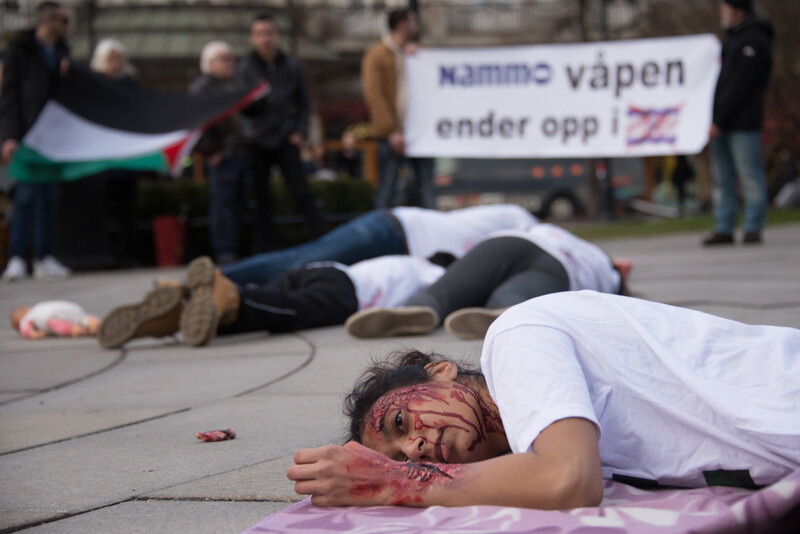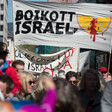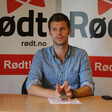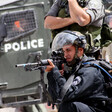The Electronic Intifada Oslo 30 April 2015

Palestine solidarity activists stage a die-in outside the Norwegian parliament in Oslo on 30 March.
It may come as a shock that Norway, the home of the Nobel Peace Prize and the Oslo accords, is funneling weapons to Israel.
Palestine is second only to Afghanistan in the amount of aid it receives from the Norwegian government. Last year, Norway’s aid to Palestine totaled nearly $100 million.
Norway also coordinates an international donor forum for Palestine that includes the European Union and the United States.
But while Norway cherishes its image as a humanitarian leader in the Middle East, it is profiting from Israel’s military occupation and assaults on Palestinians.
On 30 March this year, BDS Norway — a group supporting the Palestinian call for boycott, divestment and sanctions against Israel — held a “die-in” protest on the plaza in front of the Norwegian parliament.
Among the banners explaining the action to passersby was the message: “Nammo weapons end up in Israel.” Nammo — short for Nordic Ammunition — is an arms manufacturer in which the Norwegian government owns 50 percent of the shares.
While Norwegian law prohibits direct sales of weapons to countries engaged in armed conflict — including Israel — Nammo’s wholly owned US-based subsidiary, Nammo Talley, sells anti-tank rocket launchers and explosive armor-piercing bullets to the Israeli military.
Loopholes
A 2012 report by Norwegian People’s Aid detailed this and other loopholes allowing arms sales to Israel, and the issue gained further publicity in Norwegian media during last summer’s Israeli military assault on Gaza.
As the Palestinian death toll topped 2,200, at least 1,483 of whom were civilians, a front-page photo in the daily newspaper Dagbladet showed a Palestinian woman in Gaza holding a discarded M72 rocket launcher with Israeli military markings clearly labeled as made by Nammo Talley.
The M72 is generally considered to be an anti-tank weapon. But as one Norwegian commentator has noted, “It is handy for firing through walls and blowing up whatever is on the other side.”
“Norway is part of the Israeli occupation,” said former Israeli Air Force pilot Yonatan Shapira, who was on a speaking tour in Norway last September. “So when you’re sitting here in Norway and looking at the news of what happened in Gaza you should bear in mind that the weapons that you see, some of it is made here.”
“My challenge to the people here is when will Norway be courageous enough to stop being part of the destruction?” asked Shapira, now a Palestine solidarity activist. “Israel gets an unlimited amount of weapons and these weapons are being used to kill civilians and we need to stop it.”
Last year, Shapira participated in a protest at the Nammo factory in Raufoss in which activists filled the factory’s entrance area with bloodied dolls symbolizing Palestinian children killed by the Israeli military.
“The people that came to [work in] the factory that morning were really nice people,” said Shapira. “Some of them just dropped [off] their daughter at a piano lesson. But somebody has to remind them that they are providing weapons to mass killings somewhere else in the world.”
Explosives for Israel
The namesake of Norway’s famous Peace Prize is also implicated in Israel’s military actions. The corporate webpage for Chemring Nobel boasts of “an unbroken history of more than 130 years of explosives production … with a tradition of innovation and development going back to Alfred Nobel.”
“I thought it’s done, you know, he sold the company and today they are making lollipops,” said Shapira. “But no, the company exists and they manufacture explosives that are being sent to Lockheed Martin, which is one of the giant weapons factories in the States. There it’s being put in the Hellfire missiles that are being used by Apache helicopters and drones that are being fired on people in Gaza.”
In addition to creating US subsidiaries or selling components to US weapons-makers, companies can also legally sell weapons made in Norway to NATO allies that then re-export them to countries banned by Norwegian law. Israel isn’t the alone in this category.

Faith-based activists in Oslo hold a vigil for the victims of Norwegian arms on 14 April.
The Czech Republic, the main importer of Norwegian ammunition, re-exports to Saudi Arabia, Sudan and Egypt. The US exports to many other countries where conflicts or human rights abuses are rife, including Colombia, Nepal, Sri Lanka and, of course, Israel.
In April, a coalition of church-based activists gathered in front of the Norwegian parliament to protest arms sales to all such countries. In a silent vigil amid the chill of April snow showers, the activists held candles and placed roses on a coffin symbolizing the victims of these weapons. The vigil was part of a year-long campaign by Changemakers, the youth organization of Norwegian Church Aid.
“Parliament can change the guidelines,” said Changemakers Assistant Director Tuva Widskjold, “and in that way stop our export to authorities who commit serious violations of human rights.”
Reducing casualties?
According to Changemakers, polls show that seven out of ten Norwegians don’t want to export arms to such countries. But elected leaders have yet to change the laws, citing the priority of the Norwegian economy and jobs.
“While Norway continues to criticize events in Israel they keep exporting ammunition that contributes to gross violations and also great human suffering,” said Borghild Tonnessen-Krokan of the Norwegian Forum for Development and the Environment, who attended the vigil. “We demand that the Norwegian government demand an end-use certificate when it exports weapons to NATO allies, not only to other countries.”
Troublingly, elements of Norway’s current right-wing government would move things in the opposite direction. The misleadingly named Progress Party (FRP), which is part of the government, has urged a lifting of the ban on arms sales to Israel.
FRP spokesperson Jørund Henning Rytman was quoted by Defense News in 2013 as saying, “I do not see any major fundamental differences between exporting to Israel and the United States.”
While this position is perhaps more ideologically consistent than that of previous governments, Rytman has even suggested that the improved accuracy of Norwegian-made weapons may have helped to reduce civilian casualties among Palestinians. With humanitarians like these, Norway’s peace-loving image may be in for a drastic change.
In the face of such attitudes, Shapira urges continued activism — a call that applies to many countries beyond Norway, including the US. He said: “I think that if we try to touch those places in our society that are indifferent because of ignorance or because of choosing to be ignorant, than we can actually make a difference.”
Ryan Rodrick Beiler is a freelance photojournalist and member of the ActiveStills collective. He lived in Palestine from 2010-2014. He now lives in Oslo, Norway.





